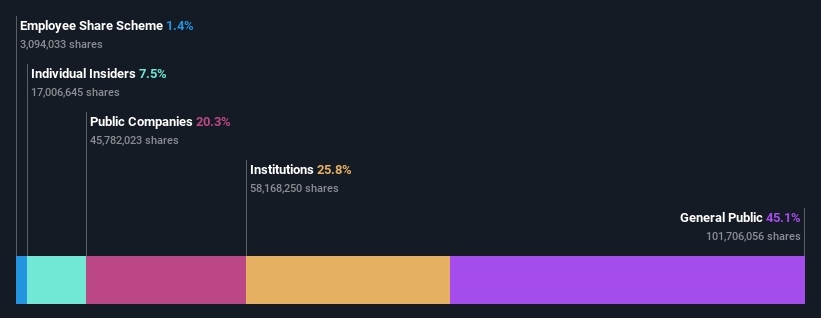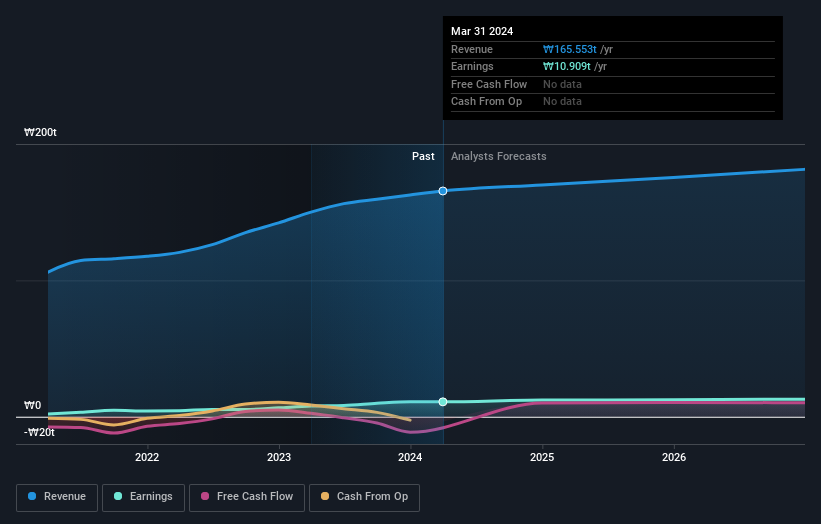- South Korea
- /
- Auto
- /
- KOSE:A005380
While institutions own 26% of Hyundai Motor Company (KRX:005380), retail investors are its largest shareholders with 45% ownership
Key Insights
- The considerable ownership by retail investors in Hyundai Motor indicates that they collectively have a greater say in management and business strategy
- A total of 23 investors have a majority stake in the company with 50% ownership
- Institutions own 26% of Hyundai Motor
Every investor in Hyundai Motor Company (KRX:005380) should be aware of the most powerful shareholder groups. And the group that holds the biggest piece of the pie are retail investors with 45% ownership. That is, the group stands to benefit the most if the stock rises (or lose the most if there is a downturn).
And institutions on the other hand have a 26% ownership in the company. Generally speaking, as a company grows, institutions will increase their ownership. Conversely, insiders often decrease their ownership over time.
In the chart below, we zoom in on the different ownership groups of Hyundai Motor.
Check out our latest analysis for Hyundai Motor

What Does The Institutional Ownership Tell Us About Hyundai Motor?
Institutions typically measure themselves against a benchmark when reporting to their own investors, so they often become more enthusiastic about a stock once it's included in a major index. We would expect most companies to have some institutions on the register, especially if they are growing.
We can see that Hyundai Motor does have institutional investors; and they hold a good portion of the company's stock. This implies the analysts working for those institutions have looked at the stock and they like it. But just like anyone else, they could be wrong. When multiple institutions own a stock, there's always a risk that they are in a 'crowded trade'. When such a trade goes wrong, multiple parties may compete to sell stock fast. This risk is higher in a company without a history of growth. You can see Hyundai Motor's historic earnings and revenue below, but keep in mind there's always more to the story.

We note that hedge funds don't have a meaningful investment in Hyundai Motor. Hyundai Mobis Co.,Ltd is currently the company's largest shareholder with 20% of shares outstanding. With 6.9% and 5.0% of the shares outstanding respectively, National Pension Service and Mong-Koo Chung are the second and third largest shareholders. Mong-Koo Chung, who is the third-largest shareholder, also happens to hold the title of Chairman Emeritus.
Looking at the shareholder registry, we can see that 50% of the ownership is controlled by the top 23 shareholders, meaning that no single shareholder has a majority interest in the ownership.
While studying institutional ownership for a company can add value to your research, it is also a good practice to research analyst recommendations to get a deeper understand of a stock's expected performance. Quite a few analysts cover the stock, so you could look into forecast growth quite easily.
Insider Ownership Of Hyundai Motor
The definition of an insider can differ slightly between different countries, but members of the board of directors always count. The company management answer to the board and the latter should represent the interests of shareholders. Notably, sometimes top-level managers are on the board themselves.
Insider ownership is positive when it signals leadership are thinking like the true owners of the company. However, high insider ownership can also give immense power to a small group within the company. This can be negative in some circumstances.
We can see that insiders own shares in Hyundai Motor Company. It is a very large company, and board members collectively own ₩4.0t worth of shares (at current prices). It is good to see this level of investment. You can check here to see if those insiders have been buying recently.
General Public Ownership
The general public, who are usually individual investors, hold a 45% stake in Hyundai Motor. This size of ownership, while considerable, may not be enough to change company policy if the decision is not in sync with other large shareholders.
Public Company Ownership
We can see that public companies hold 20% of the Hyundai Motor shares on issue. It's hard to say for sure but this suggests they have entwined business interests. This might be a strategic stake, so it's worth watching this space for changes in ownership.
Next Steps:
It's always worth thinking about the different groups who own shares in a company. But to understand Hyundai Motor better, we need to consider many other factors. For instance, we've identified 2 warning signs for Hyundai Motor (1 is significant) that you should be aware of.
If you would prefer discover what analysts are predicting in terms of future growth, do not miss this free report on analyst forecasts.
NB: Figures in this article are calculated using data from the last twelve months, which refer to the 12-month period ending on the last date of the month the financial statement is dated. This may not be consistent with full year annual report figures.
Valuation is complex, but we're here to simplify it.
Discover if Hyundai Motor might be undervalued or overvalued with our detailed analysis, featuring fair value estimates, potential risks, dividends, insider trades, and its financial condition.
Access Free AnalysisHave feedback on this article? Concerned about the content? Get in touch with us directly. Alternatively, email editorial-team (at) simplywallst.com.
This article by Simply Wall St is general in nature. We provide commentary based on historical data and analyst forecasts only using an unbiased methodology and our articles are not intended to be financial advice. It does not constitute a recommendation to buy or sell any stock, and does not take account of your objectives, or your financial situation. We aim to bring you long-term focused analysis driven by fundamental data. Note that our analysis may not factor in the latest price-sensitive company announcements or qualitative material. Simply Wall St has no position in any stocks mentioned.
About KOSE:A005380
Hyundai Motor
Manufactures and distributes motor vehicles and parts worldwide.
Undervalued average dividend payer.
Similar Companies
Market Insights
Community Narratives



